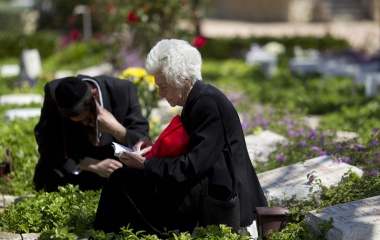
The increasing age for marriage coupled with the high cost of housing has led to a situation of more and more children in their 20's and beyond living at home. The financial responsibilities of these working children is often a most sensitive issue with many parents uneasy about charging rent to their children. While it is a given for parents to support their children at a minimum through their high school years - and for most through college, many until marriage and for some even beyond - the parameters of parental support under Talmudic law were apparently much less demanding.
"A father is not obligated to support his daughter" (Ketubot 49a). This is a rather incredulous statement and the Gemara wonders who is the author of this teaching. "It is not Rav Meir, nor Rav Yehuda nor Rav Yochanan ben Bruka". The Gemara explains that according to Rav Meir a father is obligated to support his daughter "and even more so must he support his sons, who are involved in [the study] of Torah". Rav Yehuda on the other hand says it is a mitzva to support one's sons and "even more so one's daughters because of degradation".
Our Sages considered having to ask for support most degrading and ordered that one do almost anything to avoid such a situation. "Flay carcasses in the marketplace to earn a living and do not say I am a priest, I am a distinguished person" (Pesachim 113a). For a woman (or young girl) to have to beg for support was especially tragic and thus it is the woman who must take precedence in support. Rav Yochanan ben Bruka is of the view that the father need not support his sons or his daughters.
There seems to be no view that supports the implication of the Mishna that a father[1] must support his sons but not his daughters. The Gemara explains that this implication is incorrect. Both Rav Meir and Rav Yehuda agree that there is a mitzva - though not an obligation[2] - to support both your sons and daughters[3].
What is even more striking about this Mishna is that after the father passes away there is an obligation of the estate to support the daughters until they are married. Only after money is set aside for this support may the estate be distributed to the inheritors. Can it really be that while the father is alive he is not actually obligated to support his children but must do so from the grave?
There is no greater love than that of a parent to a child. The idea that one would need to obligate and legislate a requirement to support one's children speaks volumes about a society. Of course it is a mitzva to support one's children. But there is no need to obligate such. However after death one might have argued that the obligation is lessened. After all "the dead are exempt from mitzvoth" (Shabbat 30a) and thus the Mishna must specifically mention such an obligation.
Alas, we are witness that not all parents shower love and support (financial, emotional and all else) on their children. "In Usha they decreed that a person must feed his sons and daughters while they are young"[4] (Ketubot 49b). With the Temple in ruins and the Jewish people exiled what was once obvious became less so.
[1] As we discussed in our last post it is the father who would was responsible for the financial well-being of the family. Presumably if the mother opts out of this agreement (see here) she too would be obligated to help support the children.
[3] Rav Meir argues that the Mishna mentions only daughters to teach that while there is no obligation to feed daughters there is a mitzva to do so whereas Rav Yehudah explains that while there is a mitzva to feed one's daughter there is no actual obligation. Rav Yochanan ben Bruka explains that since there is an obligation of support after death, the Mishna specifically mentions the lack of obligation while living.
[4] Once the children were no longer "young" they went to work. The notion of a full time student or learning in kollel had yet to be invented.



